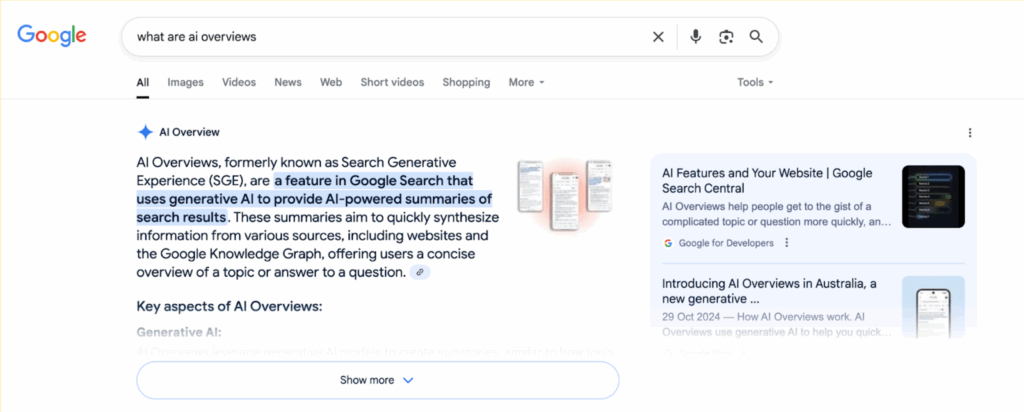About Google’s New AI Overviews and AI Mode
Search Engine Optimisation (SEO) is facing yet another shake-up, this time from Google’s latest AI-powered features that aim to answer questions right within search results. First came AI Overviews, and now, the landscape is shifting again with the introduction of Google’s AI Mode.
You may have heard the buzz predicting, yet again, that “SEO is dead”. But here’s the truth: SEO is more relevant than ever; it’s simply changing. Like any tool in digital marketing, SEO continues to adapt to new technology, and so are we at Splice Marketing.
If you’re a health or medical clinic owner, here’s what you need to know about the latest SEO updates.
SEO is Not Dead, Just Evolving
The “SEO is dead” buzz has been around for years and often accompanies changes that shift how search results work. At Splice Marketing, we constantly keep up to date with the changing landscape of SEO and adapt our SEO strategies to respond to and use changes to our clients’ advantage.
Right now, Google’s AI features are getting attention because they put answers right in front of users, which means that there is potential for people to get the information they need in search results, without having to click through to a full website. Some businesses worry this means people will stop visiting sites altogether, resulting in plummeting organic traffic. While some people will see a reduction in organic traffic as a negative thing, in reality, it’s better to understand this as a shift in how people interact with search results.
The way people search for information will change. How people will search for products and services will be different again. If you own a healthcare product or local healthcare business, you still need to be visible to people when they need you.
The bottom line? SEO remains an essential way to gain visibility and authority online, and as AI becomes part of the search experience, adapting to these changes will allow businesses to not only survive, but thrive.
Let’s break down the role of AI in search further, how it’s impacting traffic, the importance of other SEO tactics, and what it means for your healthcare business.
What are AI Overviews and AI Mode? What’s the big deal about them?
Google AI Overviews
Google’s AI Overviews are snippets of information that show at the top of the search results page. These AI-generated summaries provide instant answers to user queries, meaning users might find what they’re looking for without clicking through to other sites.

Google AI Mode
Building on this, Google’s AI Mode offers a more in-depth and interactive experience. Think of it as a supercharged search assistant. Instead of just a summary, AI Mode allows users to ask follow-up questions, explore subtopics, and engage in back-and-forth dialogue. It uses a “query fan-out” technique which breaks down complex questions into smaller parts, searching multiple sources to provide users with a comprehensive answer.
Unlike traditional search results, both AI Overviews and AI Mode curate information from multiple sources, even embedding clickable links! This shift marks an opportunity for businesses to appear within the AI-generated response itself, capturing attention at the very top of search results (even above paid ads).
While these features take up prime space in Search Engine Results Pages (SERPs), they also create an opportunity for visibility if your content is helpful, informative, and structured for search.
How do we expect AI tools to impact organic traffic?
AI Overviews and AI Mode primarily serve up helpful content – ideal for answering specific questions. But because the content is displayed directly in the search result, fewer users may feel the need to click through to a website for simple answers.
While this might reduce click-through rates (CTR) for some informational searches, the traffic that does reach your site could actually be of higher quality. For example, a user who engages with an AI-generated response and then clicks a link is often more engaged and interested in your content and services.
The conversational nature of AI Mode means that by the time they click, they have a much clearer idea of what they are looking for. This further highlights the importance of providing high-quality content that positions you as a trusted business.
How will AI in Search impact Splice’s healthcare clients?
For healthcare businesses focused on attracting patients, clients, or referrals, the impact is likely more positive than it will be for informational-only sites.
The nature of service-based searches, like “physiotherapy near me” or “private GP consultation,” is also evolving. While these high-intent queries once led primarily to traditional results and ads, Google’s conversational AI is now stepping in to provide more direct, interactive answers. This shouldn’t be seen as a threat, but as a major opportunity to improve the patient conversion experience.
Imagine the AI helping a user find exactly the right service you offer based on a conversational exchange. This streamlines the journey from search to booking, meaning the traffic that comes your way is highly qualified and ready to act. It’s a chance to be the definitive solution presented by the AI at the very moment of a potential patient’s need.
Furthermore, integrations with Google Shopping for features like virtual try-on or agentic checkouts (where you can make a purchase within the search results) signal a future where AI actively assists in transactional journeys. For healthcare businesses, this could evolve into AI-assisted appointment booking or product purchases, making a strong online presence even more crucial.
The move towards more conversational, AI-powered search doesn’t kill SEO — it enhances the need for genuine expertise and a user-focused approach. At Splice Marketing, we ensure that healthcare clients capture intent-driven traffic by creating websites that have quality, relevant content and strong technical SEO foundations. Optimising for both content and technical aspects drive local organic SEO traffic and helps position our clients as trusted, expert resources for prospective patients.
Read the next article in our next articles in our New Era in Search series: ‘Why it’s still essential to be seen as a Subject Matter Expert’.







